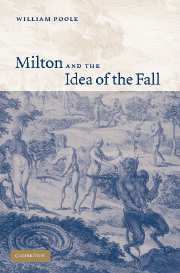Book contents
1 - The Fall
Published online by Cambridge University Press: 10 December 2009
Summary
In early-modern England, you could not escape the Fall. It was political: if man was fallen and wayward, how should he be governed? Was the original state of Adam as, supposedly, head and ruler of his family, holding, ‘by Right of Father-hood, Royal Authority over [his] children’, intrinsic justification for a patriarchalist monarchy? Was ‘the desire of Liberty … the First Cause of the Fall of Adam’? Or, asked Republicans of Patriarchalists, was Adam, created in the image of God, originally free, and in possession of political liberty, and does this apply to his progeny too? In 1649 Milton certainly said so: ‘No man who knows ought, can be so stupid to deny that all men naturally were borne free, being the image and resemblance of God himself, and were by privilege above all the creatures, born to command and not to obey: and that they liv'd so.’
The Fall also had class implications: in a famous sermon preached late in 1662, Robert South declared that it was as difficult for us now to imagine the height of unfallen Adam's intellect ‘as it is for a Peasant bred in the obscurities of a cottage, to fancy in his mind the unseen splendour of a Court’. By contrast, Defoe later claimed that ‘the most noble Descendants of Adam's Family, and in whom the Primogeniture remained, were really Mechanicks’.
Of course, Eve's role as temptress secured for her daughters particular opprobrium. As Abraham Cowley lamented:
Nay with the worst of Heathen dotage We
(Vain Men!) the Monster Woman Deifie;
Finde Stars, and tye our Fates there in a Face,
And Paradice in them by whom we lost it, place.
- Type
- Chapter
- Information
- Milton and the Idea of the Fall , pp. 9 - 20Publisher: Cambridge University PressPrint publication year: 2005

